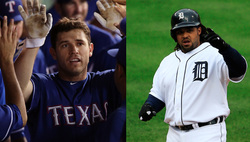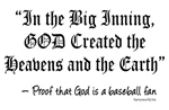
The decision to move Fielder had more to do with GM Dave Dombrowski wanting to free up salary to extend 2013 AL Cy Young Award Winner Max Scherzer. Additionally, he will be able to shake up a good team that just has not been able to complete the task of winning the World Series. The issue that the Tigers were dealing with was the fact that other teams were not going to simply take on Fielder's contract AND give the return warranted under my fair MLB trade proposition. That is why the Tigers received Kinsler, a good player, but one that is not considered in the same league as Fielder. The Rangers were interested in signing Fielder a couple off seasons ago, but simply did not want to invest the amount of money Detroit was willing to. The $30 million that the Tigers kicked in to help pay his contract allowed the Rangers to feel more comfortable about taking it on. If the Tigers had been willing to take on a significant amount of the deal, of course the Rangers would have had to give up some more significant players than just Kinsler. It should turn out to be a deal that will help both teams.
The Fielder/ Kinsler trade in its own way was kind of revolutionary. The Boston Red Sox had made a similar trade with the Los Angeles Dodgers in 2012 where they traded Carl Crawford, Adrian Gonzalez, Josh Beckett and Nick Punto to LA and received a much less impactful package in return. Comparing both deals, it is understood the Dodgers received the better players in the mega-trade while the Rangers received the better player in the deal with Detroit. Other teams have plenty of interest in the success or failure of these types of trades. While the Red Sox/ Dodgers deal looks like it helped both teams, taking LA to the NLCS and helping the Red Sox to a World Series Championship, you have to look no further than the Miami Marlins to see that sometimes unloading players to move their contracts is a complete sign of surrender for those who want to play competitive baseball.
I am sure the Milwaukee Brewers will be keeping an eye on how the Fielder trade works out. Fielder's former team has OF Ryan Braun under contract until the year 2020. Perhaps the Brewers aren't desperate to move Braun, but probably had to at least considered trying to cut their losses after his PED suspension in 2013. Right now, Milwaukee is in the phase of wanting to get competitive talent that matches that of Braun in a deal. Otherwise, it seems to be no inclination they will deal him. Oddly enough, if Braun returns to form next season, the Brewers may be more inclined to move him then if he falls far from his MVP season in 2011. If Braun struggles, it would mean either he is a Brewer for life or the team has to pay a large sum of the contract for him to get out of Milwaukee. If he hits MVP form, the Brewers would be able to move the deal and get a quality return for him. But what happens if Braun simply puts up above average numbers? For example, what if Braun plays in 155 games in 2014 and hits .280, 28, 90 with 35 2Bs? And a guy who has a .312 career batting average sees his OPS drop to .869 for the full season (his OPS in 2013 over 61 games) or lower. Braun's career OPS is currently .938. It would be safe to say his future decline could have to do with being off the PEDs. The Brewers, of course, could choose to hold onto him or consider moving him in a trade.
The problem with this scenario is, the team potentially trading for Braun is looking for the 2011 MVP version. They would not be getting that. But Braun is getting paid like the 2011 MVP version. At this point, if the Brewers wanted to move Braun, they would have to either pay a significant portion of his remaining contract and receive quality players back or deal him and a portion of the contact to another team and receive maybe a good player, but not one that will produce even at my projected 2014 results.
Another example is LA Dodgers OF Matt Kemp, the 2011 runner up in the NL MVP voting to Braun. Kemp's story is different, as of now, as Kemp has simply been hurt for the majority of the past two seasons. After his 2011 performance put Kemp in the category of the best player in the game discussion, Kemp was on his way to that status again in 2012, before an injury around the All Star break. He has not been the same player since. Kemp is signed through the year 2019, as his 8 year, $160 million extension started in 2012. Similar to Braun, Kemp will be watched closely as he looks to come back healthy in 2014.
The only difference is the fact that the Dodgers have a situation where they have 4 OFs for 3 spots, due to the emergence of Yasiel Puig. Though Andre Ethier is also on the block, it may be in the Dodgers best interest to move Kemp. Regardless, it is likely one or the other will be moved before the start of the 2014 season. Ethier, who started his 6 year, $95.5 million deal in the 2012 season as well, looked nothing like the player he was before he signed the extension. In fact, his .272, 12, 52 in 142 games make his extension look like more of a mistake than Kemp's. Obviously, the jury is still out on Kemp as he looks to return from his injuries.
Right now, if a team was to trade for Kemp or Ethier, the Dodgers would have to either pay a large percentage of the rest of the contract and receive a comparable package (ie. top prospects, impact players) or pay a smaller portion of the contact and receive a player or two that would not make the trade seem fair on those players best days and the LA players worst.
Players that have signed free agent contacts this offseason could find themselves in the same situation down the road. Questions already exist over Albert Pujols first two seasons with the Angels. Could you see the Angels move him to a team just for the sake of the salary relief? Seems unlikely, but I am sure it has been discussed. Jacoby Ellsbury is now under contract for the Yankees for the next 7 seasons. Robinson Cano will now be getting paid from the Seattle Mariners for the next 10. Whatever happens, I am sure teams will be looking in to the success or failure of the Prince Fielder and $30 million to the Rangers for Ian Kinsler trade as a marking grounds over whether future trades like that can be made.

 RSS Feed
RSS Feed
